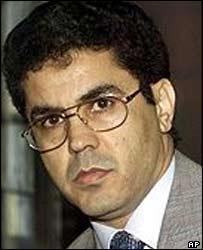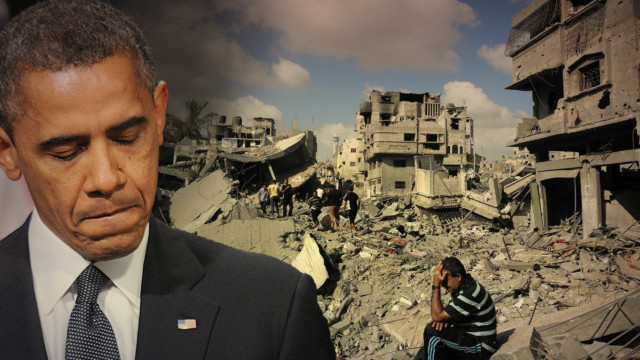First, Obama falsely portrayed Gaddafi as a monster; then, he lied about the need for harsh sanctions to punish him for crimes he never committed and, finally, he launched an illegal war under a pretext as phony as Lyndon Johnson’s Tonkin Gulf Resolution and George W. Bush’s Weapons of Mass Destruction.
Once upon a time, in a faraway land that was very rich because of its oil wells, a bad king kept his people in poverty and subjected women to sexual and domestic abuse. But after many years of oppression, a charismatic young officer overthrew the bad king in a bloodless revolution that lasted less than two hours and in which nobody died.
Even the bad king was allowed to live out his life in a luxurious villa, surrounded by family and servants, until he died peacefully of old age many years later, at age 93.
The dashing young officer quickly abolished the monarchy and established a People’s Congress. He threw open the royal treasury and distributed its riches to the people, so that they prospered. A free home was guaranteed to every citizen, and college education was also free. So was medical care—and if the country’s own doctors couldn’t cure your illness, the government paid the cost of sending you to a country where they could.
Happy were the people, but happiest of all were the women. The new government not only liberated them from sexual and domestic abuse; it also granted them full and equal rights with men, and they won more than half the seats in the People’s Congress.
The above may sound like a fairy tale, but it actually happened.
In 1969, 27-year-old Colonel Muammar Gaddafi overthrew the Libyan monarch, Muhammad Idris bin Muhammad al-Mahdi as-Senussi, in a bloodless coup that took less than two hours and in which no one died. And the Libyan people received all of the benefits described above.

However, the “fairy tale” did not have a happy ending.
Western powers were not pleased to see the Libyan people enjoying the benefits of their extensive oil reserves, which the colonial powers had been virtually stealing for themselves for decades under King Idris, in return for helping him remain in power. The king also allowed Britain and the U.S. to open military bases in the country.

The Western powers wanted those good days to return. For that, they had to get rid of Gaddafi, who had not only nationalized Libya’s oil for the benefit of its people, but was also planning to start a Pan-African currency that could help turn African nations into producers of high-value products instead of being exploited by the West merely as suppliers of raw materials.
The first step was to crush the Libyan economy with punitive sanctions.
On March 4, expert witnesses testified at an International People’s Tribunal on U.S. Imperialism about the adverse impact of sanctions on Libya imposed by the U.S. since the 1970s, and how they set the groundwork for the 2011 U.S.-NATO invasion that destroyed Libya.
Organized by an assortment of peace and social justice organizations, the hearings were part of a series that aims to spotlight the pernicious impact of U.S. sanctions on 16 countries in Latin America, Africa and Asia, arguing that such sanctions function as a “key tool of U.S. imperialism.”
The latter was certainly the case with regard to Libya, on which the Nixon administration began applying sanctions in 1971, two years after Gaddafi’s revolution against King Idris, who had ruled Libya from 1951 to 1969.
After he came to power, Gaddafi very rapidly removed the massive U.S. military base at Wheelus along with a British military base and took measures to nationalize Libya’s oil industry so that oil revenues could be used to develop Libya’s economy.

Gaddafi later set up a base to train Arab and African liberation and Palestinian resistance fighters, and tried to advance Pan-African unity and a South Atlantic Treaty Organization (SATO) that could rival the North Atlantic Treaty Organization (NATO).

Because of his independent policies, resistance to foreign colonialism, and the threat that he would free Africa from the choke-hold of “dollar dominance,” Gaddafi was for decades a target of Western regime change operations and sanctions.
At the tribunal, Hamza al-Toumi, a Libyan engineer and military expert, detailed how U.S. sanctions specifically targeted the aviation industry in an attempt to weaken its economy and military.
After the sanctions were imposed, Libya could no longer obtain many of the spare parts it needed to repair planes and had to drastically cut the number of domestic flights. Libyans had to drive to neighboring countries to fly.

Many pilots had to leave the country and the whole economy suffered with the lack of investment in new airports.
Furthermore, at least one plane crashed because it did not have proper safety equipment.
There were many more road accidents because people had to always travel by road, and people suffering from medical emergencies died because they could not be airlifted to hospitals due to a dearth of airplanes and helicopters.
On the military side, al-Toumi emphasized that Libya could not upgrade its air defense system because of the lack of spare parts, making it vulnerable to foreign invasion. During the U.S.-NATO attack of 2011, it could not effectively fight back. The training of pilots in the country had been hampered, and Libyan Air Force planes were grounded.

Essam Ekhargli, a Ph.D. student at the University of Illinois, read a statement prepared by the former Minister of Health under Gaddafi, Mustafa Zaid, who emphasized that the sanctions were a new type of war waged by the West on Libya that affects regular people by restricting their access to quality health-care and travel and makes bank transfers very difficult.
Libyan companies and institutions could not buy items they needed, including advanced medical equipment made in the U.S. like MRI machines and CT scanners.
Zaid specified that when Gaddafi came to power in 1969, there were very few doctors in Libya, which was heavily dependent on foreigners in the health-care sector, marking the sanctions as especially cruel.
The sanctions further resulted in the freezing of Libyan assets that were held in overseas banks, depriving the Gaddafi government of its own revenue streams.
Fraudulent Pretexts
The U.S. and UN expanded sanctions on Libya in the early 1990s under the pretext that Libya had carried out the bombing of Pan Am Flight 803 over Lockerbie, Scotland, in December 1988, when there was no proof of this.

The case against a Libyan intelligence officer, Abdelbaset al-Megrahi, who was accused of masterminding the Lockerbie bombing, depended on an unreliable Libyan defector and forensic evidence that proved to be false. Scottish law professor Robert Black called Megrahi’s trial the “most disgraceful miscarriage of justice in Scotland for a hundred years,” and UN observer Hans Kochler said that the decision [to convict Megrahi] was “totally incomprehensible and a spectacular miscarriage of justice.[1]

In 1986, another fraudulent pretext was adopted to justify a U.S. aerial attack under President Reagan: Gaddafi was accused of bombing the La Belle discotheque in West Germany and killing two American soldiers.
The chief of the anti-terrorism police in West Berlin concluded after investigating the La Belle discotheque bombing that the police had “no hard evidence let alone proof” that Libya had been involved.
When the case went to trial, the prosecution at the trial was unable to prove that Colonel Gaddafi was behind the bombing—a failure the court blamed on the “limited willingness” of the German and U.S. governments to share intelligence information.

German investigators later uncovered that Musbah Eter, a Libyan agent who was part of the group that allegedly carried out the bombing, ran a CIA-front operation in Malta and had long worked for the CIA.
He may have been acting as a provocateur who orchestrated a black-flag attack designed to provide a pretext for the U.S. bombing of Libya and the ratcheting up of deadly sanctions.

2011 U.S.-NATO Criminal Attack
The U.S. sanctions directed against Libya were designed to weaken the country in order to prepare the way for the 2011 invasion, which was based on lies and deceits.
A lot of the disaffection against Gaddafi in Libya that the U.S., Great Britain and France tried to exploit was a result of the sanctions policy, which was never reported on in the West.
The 2011 uprising in Benghazi was led by Islamists and evolved very quickly into an armed struggle against Gaddafi’s government, which was legitimate in the eyes of most of the Libyan people.
President Barack Obama, nevertheless, said Gaddafi should go. Stories were fabricated that Gaddafi was massacring his people and was about to commit genocide when, in fact, it was rebel forces and U.S.-NATO bombers that killed massive numbers of civilians.

The second to last speaker at the tribunal, Dr. Murad el-Sadawi, who works at the University of Rochester Medical Center, emphasized that rebel forces backed by the U.S. emptied the town of Tawerga of Blacks after the overthrow of Gaddafi.

El-Sadawi displayed images of civilians who were killed in U.S.-NATO airstrikes, including members of the el-Hamedi family who died in an airstrike that resulted in the deaths of 34 civilians.
The last speaker, Salah Khalifa, described the abominable conditions in Sirte during the U.S.-NATO bombing, which, he said, randomly struck civilian areas. Khalifa emphasized that the post-Gaddafi government passed laws that would exonerate all rebels from any crimes that they conducted so that they would not be prosecuted.

Mustafa Fatouri, a Libyan journalist, ended his talk by discussing how the U.S. is now pressing only for legislative elections but not presidential elections, which it fears Muammar Gaddafi’s son, Saif al-Islam, will win.

If that occurred, it would prove that everything the U.S. had said about Gaddafi being a brutal dictator was a lie—so they cannot allow that to happen.

